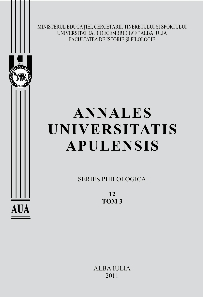Le discours indirect libre – signe de modernité
Free Reported Speech – A Sign of Modernity
Author(s): Marion Cohen-VidaSubject(s): Language and Literature Studies
Published by: Universitatea »1 Decembrie 1918« Alba Iulia
Keywords: free indirect speech; plurality; modernism; ambiguity; literature; conversation
Summary/Abstract: Languages have three ways to introduce the words of another person in a message: direct speech (DS), indirect speech (IS), free indirect speech (FIS). The transposition of a message from direct into indirect speech is an extremely complex phenomenon which has as results morpho-syntactic and semantic changes. The morpho-syntactic changes concern the grammatical categories of the verb (mood, tense), of the pronoun (personal, demonstrative, possessive), of the spatial and temporal substitutes. Regarding the semantic changes, they are due to the fact that when trying to reformulate the message from direct into indirect speech, the receiver of the message in direct speech, who has become transmitter of the message in indirect speech, starts from the meaning he has given to this message. What is even more, he will have to make explicit, by using words, all the elements which were implicit in the direct speech (gestures, intonation, mimics). In this article we analyze the IIIrd way to report the words of another person, the free indirect speech, which is a superposition of the introducing message and of the quoted message. The free indirect speech in connected with the notion of “polyphony”. It means that we speak by using the words of another person. It is an ambiguous way of using quotations. We can find signs of subordination without having grammatical subordination and signs of direct speech. The free indirect speech has an important role in literature and it is considered to be a sign of modernism. It is rather difficult to be identified, since the writers who use it tend to mix the character’s words and thoughts with their own points of view. Thus the authors can take a distance from their characters and consider them ironically The free indirect speech is interesting just because of its ambiguity and the context is the only element which determines its interpretation in a way or another. Even if it is a sign of modernism, first of all in literature, the free indirect speech is interesting for the linguistic study, which has been renewed, as well, due to its apparition. It has to be connected with Mikhaïl Bakhtine’s notion of language “plurality” in acts. Human speech contains, as a rule, other person’s discourse. The main theme of any conversation may be considered the reporting of another person’s words. That’s why we are obliged to use a number of procedures, which couldn’t be reduced to direct and indirect speech.
Journal: Annales Universitatis Apulensis. Series Philologica
- Issue Year: 12/2011
- Issue No: 2
- Page Range: 347-356
- Page Count: 9
- Language: French

